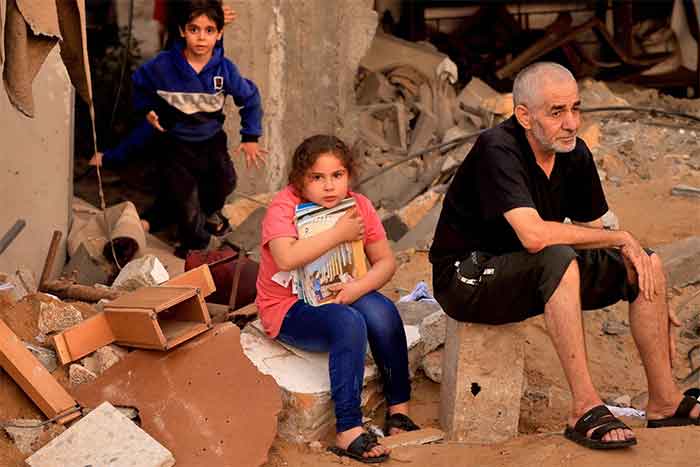
The scale of mortality, injuries, displacement, trauma and other forms of distress has been among the highest ever seen in recent times during just the first fortnight of the latest Israel-Palestine conflict. What is more, even bigger devastation is feared by many in the days to come if this conflict has a wider spread. Hence the biggest priority just now is clearly to declare ceasefire as early as possible to be followed by a big relief and rehabilitation effort and negotiations to resolve some of the contentious issues.
While clearly these are the top priorities just now, some other important but relatively neglected aspects of this conflict also deserve more attention.
Firstly, ultimately the Palestinian and Israeli people must learn and accept to co-exist in peaceful, just and friendly ways. It is not just a question of somehow enforcing a two-state solution or something similar to this, but also a question of continuing efforts to increase trust and goodwill among them at the level of people in continuing ways. Somehow this has been neglected in the middle of continuing tensions and hostility, but longer-term, justice-based peace can be secured only if enmity is genuinely left behind and a future of peace and goodwill is considered and pursued sincerely by the new generation on both sides.
Secondly, ultimately solutions of justice-based peace have to be found not on the basis of the past but on the basis of a sincere and strong commitment to a future of peace and justice. Of course history is important, but then there is a problem of how long back we go into history. Beyond a point history and mythology start getting mixed up and we can’t always clearly distinguish between what is fact and what is belief. What is more, any follies of the past should not be allowed to stand in the path of peace now and in future. While history and evidence-based study of history will always be important for humanity, the overwhelmingly strong need for justice-based peace extends much beyond whatever history may tell us.
Thirdly, there should not be overemphasis on religious identity in the sense of saying people of any one religious identity should have homeland exclusively their own, or they must necessarily have control over the territory where a place of worship or of other religious importance for them is located. Excessive concern with such religious identity makes it different to resolve several conflicts.
Fourthly, there is the strange reality of the Israeli authorities, and in particular its hard-liner Prime Minister Benjamin Netanyahu having facilitated the emergence and strengthening of Hamas as a counter to secular Palestinian forces (like the PLO and Fatah), including facilitating the transfer of vast amounts of money from Qatar for Hamas. This is part of the wider phenomenon of the forces of imperialism using fundamentalist/sectarian groups to counter, defeat or attack secular/socialist/communist groups in many countries. In Indonesia alone in mid-sixties, accompanying the ouster of President Sukarno, this caused about half a million deaths. However there are many other examples of this, as in Afghanistan, Palestine and elsewhere.
Fifthly, if Hamas was assisted in this way by Israeli authorities in the past, and most of all under the watch of Mr. Netanyahu, then important contact-points on both sides must have been created and maintained. It would be useful to know for how long these continued to be active, and whether these were active till recently.
Sixthly, the very big attack made by Hamas on Israel on October 7 must have required lots of preparations over a long period of time. The dominant discourse is that Hamas managed to entirely fool the powerful and efficient intelligence agencies of Israel, the USA and close allies while making these large-scale military preparations. The other possibility that these intelligence agencies knew about this but preferred to look the other way or remain quiet must also get equal importance in any unbiased investigations, with all its implications.
Seventh, isn’t it too much of a coincidence that on the precise day of the attack ie 7 October, several security units were moved away from important guarding points on borders to providing protection for religious celebrations, providing Hamas more open and secure entry-points for their highly aggressive and terrible attack.
Eighth, wasn’t it self-evident to anyone with even an introductory knowledge of the highly troubled region that at a time when the most hardliner forces in Israel are in control and they have near total support of the USA (and when US allies are in turn more subservient than in several recent decades), any such big attack on Israel as the October 7 one will almost inevitably lead to a much bigger attack by Israel on Gaza in particular? Fully aware of this high likelihood, why would Hamas, if acting entirely on its own in a rational way, make an attack that is likely to result in massive uprooting of its own support-base?
Ninth, given the fact that the October 7 attack was as much self-destructive as it was destructive, what is the possibility that the attack was specifically meant to actually provide the justification for a much bigger attack by Israel, as has actually happened?
Tenth, the people of Israel and in particular the young generation should seriously reconsider whether they are being helped by the forces of imperialism, as is widely stated, or whether they are being used by them to guard their interests in a region of critical importance, in the process condemning them to a life of high tensions and uncertainties.
Eleven, it is very clear that a very strong peace movement must be promoted and strengthened in this highly troubled region to work with continuity. Peace is strengthened not just by accords signed in distant lands; the role of people realizing the importance of living in peace with each other and learning to do so, particularly in the context of the new upcoming generation, is even more important.
Bharat Dogra is Honorary Convener, Campaign to Save Earth Now. His recent books include Planet in Peril, Protecting Earth for Children, A Day in 2071 and Earth without Borders.








































